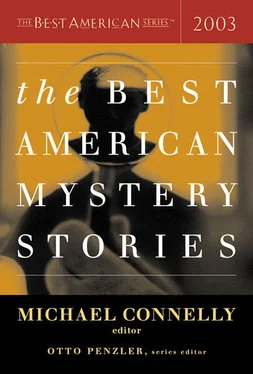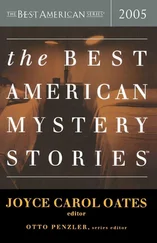I drove seven SUVs before I ever tried a sports car. I found the difference amazing. You have to dig in to write a novel. You have to cover all the angles. You need a trunk big enough to carry a lot of baggage and extra supplies. Conversely, the short story is lean and mean and built low to the ground. Its ideas burn on high-test. They are spare and to the point.
What happened to me happened to many novelists I know. You push a few books out there, get them on the shelf, and get a bit of notice. Then comes the big question: “Have you ever thought about a short story?” One thing leads to another, and you leave the big car in the garage, and you’re out running around in a candy-apple-red sports car. It’s fun. It’s a change of pace. Nine out of ten doctors recommend it.
In these same pages last year James Ellroy said he wrote his first short story only to pay off a debt. After that, he repeatedly returned to the short form. Me, too. In fact, my guess is that the debt I paid with my first short story was to the same guy — but that’s another story. The point is I reluctantly tried it and then liked it. I ended up happy for the coercive genesis of it. I got hooked. I found the short story gave me balance. Elements of character and action and intrigue were all there. But in a spare form I found invigorating. I like the short story because you can conceive and complete in hours or weeks instead of months or years. It is a form I am sure I will always come back to. It has become part of how I evaluate and then execute my ideas as a writer.
This is not by any means to say that the short story is the easier road to take. The novel and the short story are simply different animals. Or, I should say, beasts. In the spare style of the short story is the bedrock philosophy of less is more. This makes the labor over each paragraph, each sentence, intensely important. Every word must count in the short story, so the pressure of the writing experience is ratcheted down tightly on the author.
What you have here in this collection are the examples in which the author has met that pressure and come out with a beauty. Each one of these stories has a well-tuned machine under the hood.
What I have tried to do here is put together a collection that showcases the power of the short story. These stories run from the traditional to the experimental, from deadly serious to deadly satirical, from established writing masters to voices I am betting you have not heard before but will likely hear again.
Each story is a sports car that handles superbly as it takes you to a destination you haven’t been to before. Pay attention to the nuances of the ride, the telling details of character and place and emotion and experience. Watch the way a man struggles with language and a new country, the way a man sees his long-lost daughter in the reconstructed face of a murder victim. The way a woman extracts justice after being betrayed. On and on. The way you never know how somebody is going to act or react.
These aren’t shiny sports cars. No way. There is a lot of road grit on these pages. There is violence and betrayal and justice meted out without the benefit of the justice system. There is also sympathy and hard-edged romance and a haunting sense of hope. I think that is why the mystery story is so important. It can carry all the ingredients, even if the car will hold only one suitcase.
We live in uncertain times. And as I write this it looks as if they are only going to become more uncertain. The mystery story is no antidote. But it certainly can act to reassure, to help make some sense of the world. Maybe only in a small way, but that is still better than in no way.
So let’s begin. Time to take a ride. You are in luck here. I think you will find everything you are looking for in these pages.
MICHAEL CONNELLY
Doug Allyn
The Jukebox King
From Alfred Hitchcock’s Mystery Magazine
August 1960. Worst heat wave since ’43. The year of the riots.
No clouds. The sun cruising a sheet-metal sky, scorching Detroit’s mean streets all day long, hammering the heat down to the ancient salt mines beneath the city.
By noon the auto plants were like ovens. People said the temperature at Ford Rouge hit a hundred and thirty up near the steel ceilings. Overhead crane operators had to rotate down to the factory floor every half hour, panting like dogs, their clothes soaked.
Welders were working half blind, squinting through steamy visors, torches slippery with grease and sweat. And the painters in the infrared booths? Hell on earth.
But the assembly lines never stopped. Never even slowed down.
Nightfall brought no relief. Black tar bubbling in the streets and alleys like grease on a griddle, black folks boiling out of their tenements and rowhouses. Restless and surly. And thirsty. Very thirsty.
Brownie’s Lounge on Dequinder was buzzing by seven, jammed tight by ten. Selling Stroh’s beer by the gallon. Straight up. No glasses. Shop rats guzzling the brew out of the pitchers. Getting high, feeling mighty. Ready to hear some blues.
John Lee Hooker’s trio came on at nine, kicking out jams on Brownie’s postage-stamp dance floor. Big John wailing on his old Harmony guitar, James Cotton on harmonica, and a pickup bass player.
No drummer. No need for one. If you can’t feel the beat when John Lee stomps his size 13 Florsheims on a hardwood dance floor, you’d best lie down. You might be dead.
Around midnight the crowd finally started to thin. Working men had to be up at four. Making Thunderbirds, making Fairlanes, making that overtime pay. The best way for a blue-collar black man to rise in this life. The UAW saved the crap jobs for blacks, but the bosses didn’t care if a man worked double shifts for time-and-a-half. Turning out Fords for Cadillac money.
By one-forty A.M. Brownie’s Lounge was down to a die-hard handful of customers.
Four white kids, blues fans from the University of Detroit, applauding wildly as John Lee closed his show with Smokestack Lightning.
A few couples still grinding each other on the dance floor, ignoring the beat, rocking to a rhythm of their hearts and loins. Hot to trot.
A few hookers gabbing near the door, too whipped to stroll the Cass Corridor for trade.
And at the bar? One old white man. A stone killer.
Moishe Abrams had wandered in a little after one, parked his wide ass on a stool at the end of the bar, his back to the wall.
Brownie spotted him instantly. Hard to miss Moishe. Most of Brownie’s regulars were black or beige, plus a few white hipsters. Blue collar. Or no collar.
But Moishe? A surly old white dude with coarse features. Built like a cement block, squat, square, and hard. Old-timey gray suit, wide tie, porkpie brim. Still dressing like swing was the thing.
But nobody ever joked about Moishe Abrams’s clothes. Not to his face. Not even behind his back.
Carolina was working the counter. A big woman, milk chocolate skin, a smile wide as a grand piano. She dressed like a man: tuxedo blouse, bow tie, and slacks. But nobody ever mistook her for one.
Brownie stood in the shadows of his office doorway, keeping an eye on Moishe. Watched him guzzle his first drink, then knock back another just as quick.
When Moishe swiveled on his stool to watch the band, Brownie motioned Carolina over to the waitress station. Leaned in close to her, keeping his voice low.
“The white dude at the end of the bar? He drinks free. On the house.”
“You sure?” Carolina frowned. “He’s already pig-drunk and he’s throwin’ down bourbon like Tennessee’s on fire.”
“I don’t care. Give him whatever he wants, no charge. And say yessir, nossir. He likes that.”
“Fine by me, long as he knows I’m not on the menu. Who is he, anyway?”
Читать дальше












